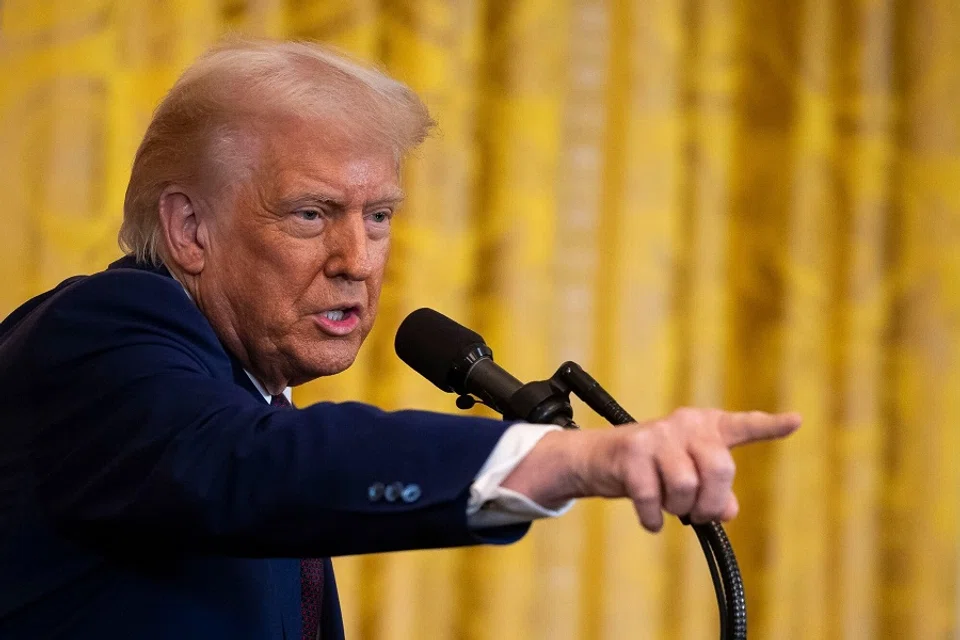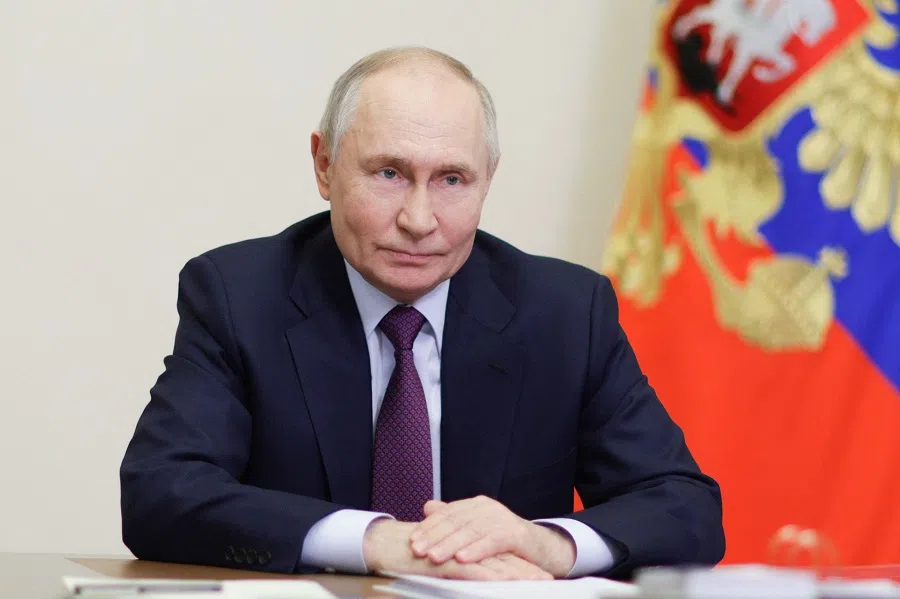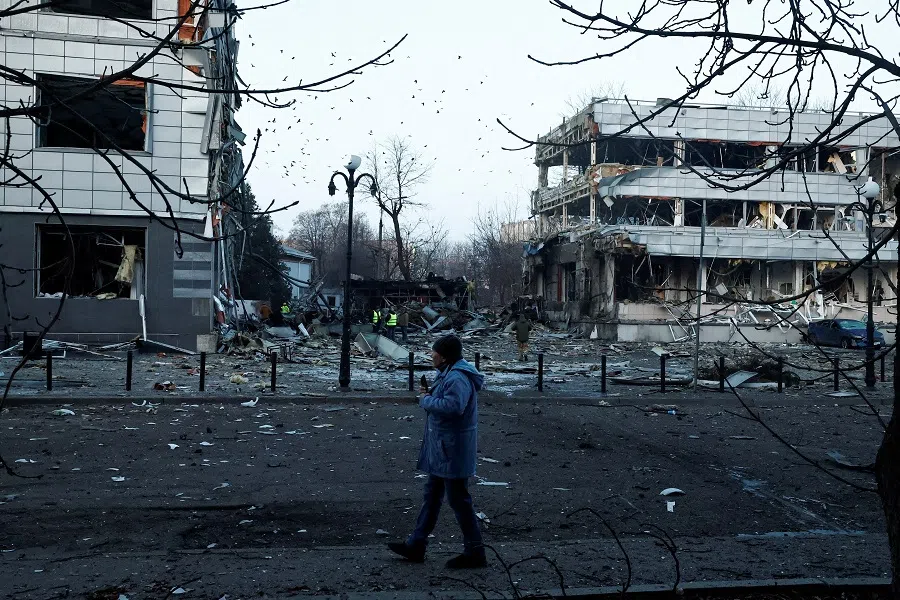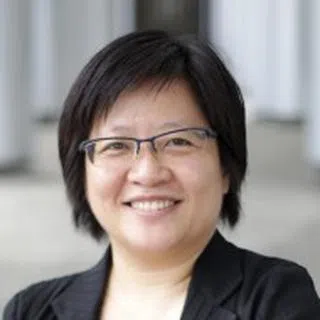Ukraine: On the menu of great power politics
With the US getting involved in possibly ending the war in Ukraine, is this just a move so that it can take on China next? Will China be part of the solution, or will it falter and be sidelined? Lianhe Zaobao associate editor Han Yong Hong looks at the issue.

What political commentators had long predicted has finally come to pass.
US President Donald Trump had boasted on numerous occasions that he could resolve the Russia-Ukraine war within 24 hours. This situation did not immediately materialise after Trump was sworn in last month, but he has indeed been quick to act. On 13 February, Trump spoke on the phone with Russian President Vladimir Putin and Ukrainian President Volodymyr Zelenskyy, after which he announced the initiation of peace talks for the Russia-Ukraine war would start “immediately”.
Trump and Putin
This was not Trump’s first contact with Putin after taking office. According to an interview he gave to US media last week, the two had already discussed ending the war more than once. Following a 90-minute call on 12 February, Trump indicated that he might meet Putin in Saudi Arabia soon. This implied that even as Russian aggression is ongoing and Putin has not agreed to any conditions, the US is already willing to push for peace talks. The US spoke with Russia first and then “informed” Zelenskyy.
Trump and Putin also discussed other topics such as the Middle East, energy, artificial intelligence and the US dollar among other issues. On social media, Trump stated that he and Putin reviewed the “great history” of US-Russia relations, the strengths of each country and the “great benefit that we will someday have in working together”.
Faced with the prospect of being sidelined, Zelenskyy spoke with Trump for an hour. On social media, Zelenskyy posted that “no one wants peace more than Ukraine” and expressed hope that they would be able to “stop Russian aggression” together with the US; a fervent attempt to maintain composure. Zelenskyy has previously insisted that unless Russian troops withdraw from Ukraine, there would be no peace talks, and that Ukraine will never cede territory for peace — principles that have now become challenging to uphold.
To put it bluntly, the US is eager for the Russia-Ukraine war to end immediately to free up resources to deal with China.
True motives?
What is the US’s true stance towards Ukraine? US Secretary of Defense Pete Hegseth’s statements in Brussels on 12 February were blunt — almost brutally honest. Hegseth told the 50 countries supporting Ukraine that the war must stop, and that Ukraine’s goal of restoring its pre-2014 borders with Russia is “an unrealistic objective” and an “illusionary goal”, as is Ukraine joining NATO. Hegseth added that if troops were to be deployed as peacekeepers to Ukraine at any point, they should be deployed as part of a non-NATO mission, and that there would not be US troops deployed to Ukraine.

Hegseth also clearly informed Europe that with domestic border security issues and with the “Communist Chinese” internationally as a peer competitor threatening the US and core national interests in the Indo-Pacific region, the top priority for the US is deterring war with China in the Pacific — not European security.
To put it bluntly, the US is eager for the Russia-Ukraine war to end immediately to free up resources to deal with China. Some Chinese commentators noted that Putin has finally waited it out long enough to see Trump take office, potentially overturning the Biden administration’s policies; but this might not necessarily be good news for China.
The peace negotiation process for the war in Ukraine could become a lever for the US to influence China-Russia relations, testing the resilience of the relationship between China and Russia.
Double dealings?
Russia, of course, also admires strength. Seeing that the US, the world’s leading superpower, is willing to let Russia end the war under favourable conditions, what backroom deals might Russia make with the US? The peace negotiation process for the war in Ukraine could become a lever for the US to influence China-Russia relations, testing the resilience of the relationship between China and Russia.
In this regard, warming US-Russia relations and its potential impact on the “back-to-back” strategic coordination between China and Russia has undoubtedly caught the attention of Chinese strategic scholars. Furthermore, a warming of US-Russia relations would also have a long-term impact on China’s efforts to build an alliance with Russia and other nations to counterbalance the US.
Of course, Trump would also leverage the peace talks over the Ukraine war to foster cooperation with China. Meanwhile, China could use this opportunity to demonstrate its value to the US and then negotiate deals with the US in other areas. When Trump delivered his remarks via teleconference at the World Economic Forum in Davos last month, he publicly called on China to help the US end the war in Ukraine, essentially asking China to exert its influence and pressure Russia. While China wants to cooperate with the US, it must be cautious of US attempts to “pull China away from Russia” and to weaken mutual trust between the two countries on the one hand, while also seeking to play a part in resolving the Ukraine war on the other.
Ukraine helpess
In the days to come, the trilateral relationship among China, the US, and Russia will enter a crucial and delicate period of adjustment. Yet Ukraine, as a primary party involved, is instead the most passive, facing the fate of territorial annexation by Russia, its mineral resources being supplied to the US, and its interests being carved up by major powers.
This is exactly the scenario described by former US Secretary of State Antony Blinken at the Munich Security Conference last year: “[I]f you’re not at the table in the international system, you’re going to be on the menu.”

A Taiwanese commentator described that the current state of the war in Ukraine is reminiscent of the partition of the Jin state by the states of Han, Zhao and Wei during the late Spring and Autumn period of ancient China. This partition was a watershed moment, marking the transition from the Spring and Autumn to the Warring States period and signifying the complete collapse of the Zhou dynasty’s system.
Ukraine’s current predicament also highlights the disregard for international law and order by major powers, signalling a return to the law of the jungle in international relations. This is exactly the scenario described by former US Secretary of State Antony Blinken at the Munich Security Conference last year: “[I]f you’re not at the table in the international system, you’re going to be on the menu.”
However, the current situation is also somewhat different from the partition of Jin. China, the US and Russia are uneven in strength, and it is clear who is strong and who is weak. The strongest party is focused solely on its own interests, leaving the weaker parties to strive to respond and struggle against their fate.
Such a world highlights the importance of independence and self-reliance for smaller nations. At this moment, while the US and Russia discuss sacrificing Ukraine, Europe may not stand idly by and watch Russia’s power expand. As the war in Ukraine moves towards its conclusion, international politics will also continue to be rewritten and reshuffled.
This article was first published in Lianhe Zaobao as “中美俄三国关系进入微妙调整期”.





